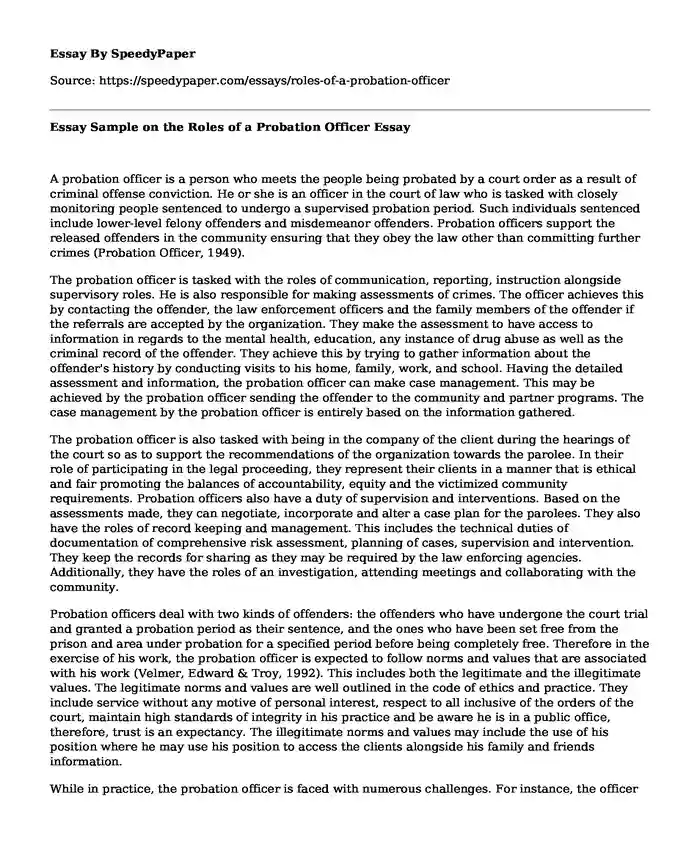
| Type of paper: | Essay |
| Categories: | Criminal justice |
| Pages: | 3 |
| Wordcount: | 693 words |
A probation officer is a person who meets the people being probated by a court order as a result of criminal offense conviction. He or she is an officer in the court of law who is tasked with closely monitoring people sentenced to undergo a supervised probation period. Such individuals sentenced include lower-level felony offenders and misdemeanor offenders. Probation officers support the released offenders in the community ensuring that they obey the law other than committing further crimes (Probation Officer, 1949).
The probation officer is tasked with the roles of communication, reporting, instruction alongside supervisory roles. He is also responsible for making assessments of crimes. The officer achieves this by contacting the offender, the law enforcement officers and the family members of the offender if the referrals are accepted by the organization. They make the assessment to have access to information in regards to the mental health, education, any instance of drug abuse as well as the criminal record of the offender. They achieve this by trying to gather information about the offender's history by conducting visits to his home, family, work, and school. Having the detailed assessment and information, the probation officer can make case management. This may be achieved by the probation officer sending the offender to the community and partner programs. The case management by the probation officer is entirely based on the information gathered.
The probation officer is also tasked with being in the company of the client during the hearings of the court so as to support the recommendations of the organization towards the parolee. In their role of participating in the legal proceeding, they represent their clients in a manner that is ethical and fair promoting the balances of accountability, equity and the victimized community requirements. Probation officers also have a duty of supervision and interventions. Based on the assessments made, they can negotiate, incorporate and alter a case plan for the parolees. They also have the roles of record keeping and management. This includes the technical duties of documentation of comprehensive risk assessment, planning of cases, supervision and intervention. They keep the records for sharing as they may be required by the law enforcing agencies. Additionally, they have the roles of an investigation, attending meetings and collaborating with the community.
Probation officers deal with two kinds of offenders: the offenders who have undergone the court trial and granted a probation period as their sentence, and the ones who have been set free from the prison and area under probation for a specified period before being completely free. Therefore in the exercise of his work, the probation officer is expected to follow norms and values that are associated with his work (Velmer, Edward & Troy, 1992). This includes both the legitimate and the illegitimate values. The legitimate norms and values are well outlined in the code of ethics and practice. They include service without any motive of personal interest, respect to all inclusive of the orders of the court, maintain high standards of integrity in his practice and be aware he is in a public office, therefore, trust is an expectancy. The illegitimate norms and values may include the use of his position where he may use his position to access the clients alongside his family and friends information.
While in practice, the probation officer is faced with numerous challenges. For instance, the officer may be dealing with dangerous offenders or others who in the course of supervising, their friends and family members upset them or complicate their work. In such cases, they are expected to apply their education, training, and the work experience to overcome such difficulties at work (CJ Careers, 2015). As a result, one of their education requirements is a bachelor degree in a field related to social work, criminal justice or behavioral sciences. Additional training by the government and the community organization equips them with the know-how of dealing with the offenders, thus making their work easier.
References
"Probation Officer". (1949). Probation, 5(21), 274-274. doi:10.1177/026455054900502103
CJ Careers: Probation Officer. (2015). doi:10.4135/9781506372181
Velmer S. B., Edward J. L., & Troy B. (1992). The Role of Probation Officers: An Examination of Statutory Requirements. Journal of Contemporary Criminal Justice. https://doi.org/10.1177/104398629200800401
Cite this page
Essay Sample on the Roles of a Probation Officer. (2022, Jun 29). Retrieved from https://speedypaper.com/essays/roles-of-a-probation-officer
Request Removal
If you are the original author of this essay and no longer wish to have it published on the SpeedyPaper website, please click below to request its removal:
- Organizational Culture Theory in a Free Essay from Our Database
- Creativity and Systematic Innovation Methods. Essay Example.
- Essay Example: Riverbend City Mission
- Essay Example Reviewing PR-Related Articles
- Delinquency Prevention Paper Sample
- Movie Review Essay Sample: Technology and Science in "The Book of Eli"
- Essay Sample on Interviewing a Senior Accountant
Popular categories




